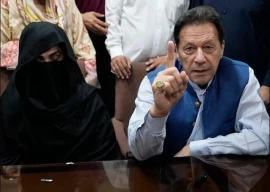
The chief justice was alluding directly to the October 1999 takeover and the November 2007 emergency declaration.
During the course of hearing petitions challenging the 18th amendment on Wednesday, the chief justice remarked that judges have promised to protect the Constitution – and the court has the jurisdiction to review amendments made to the document under which they took oath. Resuming his arguments before the 17-member larger bench Punjab Advocate-General Khawaja Harris pleaded that in the Ziaur Rehman case, judges took oath to protect the Constitution and the law.
Justice Javed Iqbal remarked that parliament is equally responsible for protecting the Constitution. If a judge takes oath after three months of an amendment, he would not review them since he took oath under the same constitution, observed Justice Saqib Nisar.
Justice Asif Saeed Khosa observed that parliaments have a role in the appointment and removal of judges in large democracies, and this does not hurt the independence of the judiciary.“Keep in mind how other appointments [are made] in the country,” remarked Justice Ghulam Rabbani to which Justice Raja Fayyaz added: “Not a single appointment is made on merit.”
Khawja Harris argued that by giving a veto to the parliamentary committee, the powers of the judiciary for the appointment of judges have been curtailed. Later he concluded his formulations. Due to the absence of advocate general of Balochistan Yousaf Laghari, the Chief Justice asked the attorney-general of Pakistan to present his formulations. However, he requested that the hearing be adjourned till Monday, which was granted.
Published in The Express Tribune, August 26th, 2010.

















COMMENTS (2)
Comments are moderated and generally will be posted if they are on-topic and not abusive.
For more information, please see our Comments FAQ